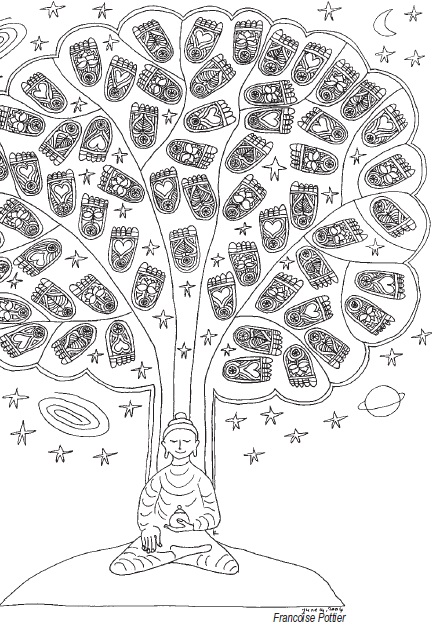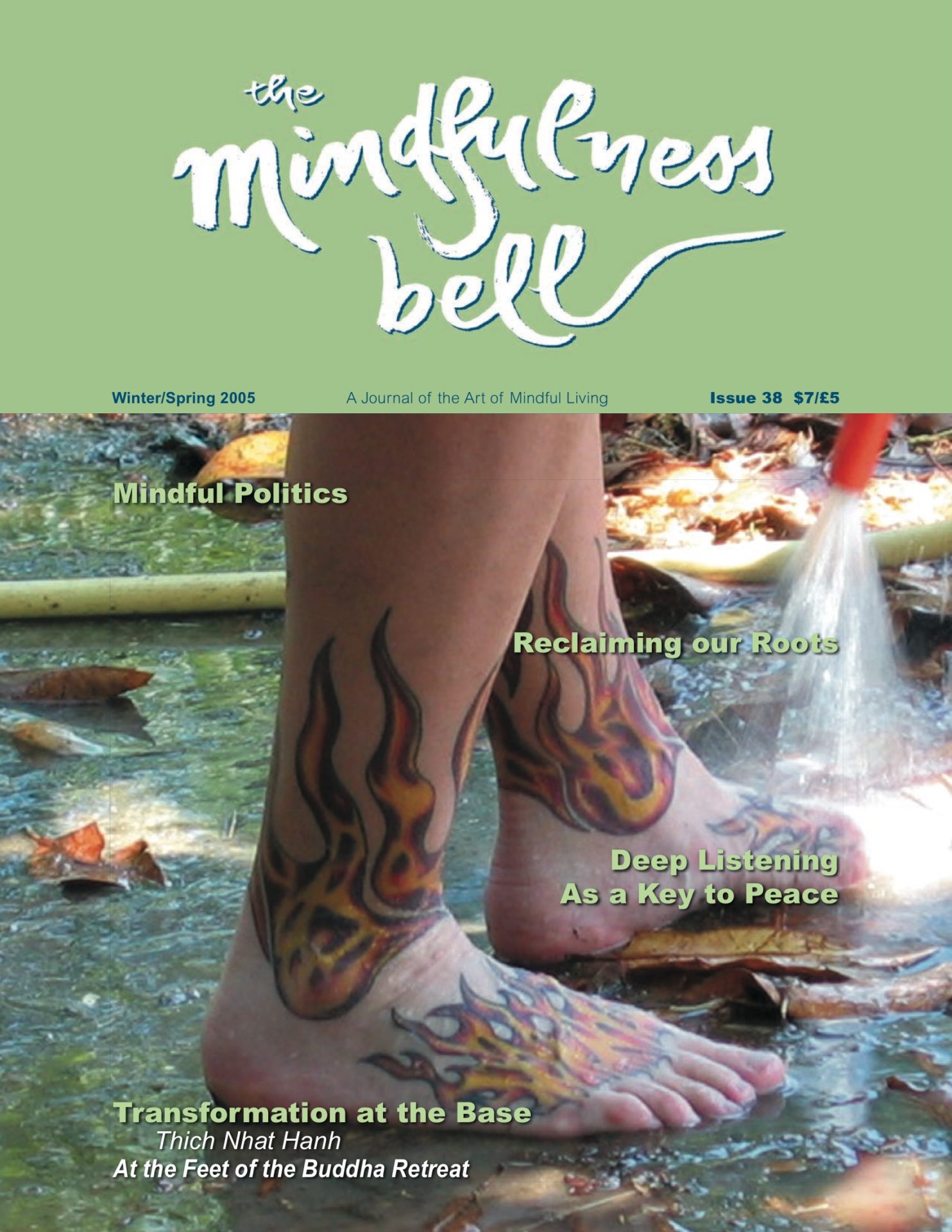From a Dharma Talk by Eileen Kiera
November 6, 2004

There are an estimated ten to the thirty-seventh, that’s ten with thirty-six zeros after it, molecules in a cubic inch. And within our bodies there are how many cubic inches? There are an inconceivable number of molecules in our body. There are two things about atoms and molecules, the basic stuff that makes up our bodies;
From a Dharma Talk by Eileen Kiera
November 6, 2004

There are an estimated ten to the thirty-seventh, that’s ten with thirty-six zeros after it, molecules in a cubic inch. And within our bodies there are how many cubic inches? There are an inconceivable number of molecules in our body. There are two things about atoms and molecules, the basic stuff that makes up our bodies; first, there are so many of them, inconceivable numbers; second, they are very long lived. They go on and on and on and on. So when I tell a story about a past life of the Buddha, we can see that the molecules that made up the Buddha are still circulating. And who we are will manifest in many, many different forms. It’s maybe not our idea of who we are, but something essential about us will continue to manifest.
So we can see that when the Buddha was speaking about his many lives before he was manifest as the body of Shakyamuni, there is some literal truth there, at some level. In traditional Buddhist cultures they speak about reincarnation very literally, about how this body becomes another body. But the Buddha taught that that doesn’t happen because there isn’t an individual, separate self. Of course we’re not going to manifest again as a self, because there’s no self there to begin with. But the likelihood of everyone in this room having atoms that once lived in the body of Buddha is very, very great, very likely, because they are constantly being mixed up and they keep going on and on and on.
So this story is about Buddha as a plumeria tree. If you’ve ever been to Hawaii you’ve seen plumeria trees. They sometimes have pink flowers, sometimes white flowers, and they’re very velvety, with five or six petals, tinged with a little yellow, and with an absolutely heavenly fragrance. When they’re blooming in the summer, Hawaii is filled with the fragrance of plumeria. One of Buddha’s lifetimes, as probably one of our lifetimes, was as a plumeria tree.
The story the Buddha told of his lifetime as a plumeria tree was that he lived next to a very beautiful lotus pond, filled with fragrant flowers, and not far from him was a very muddy little pool that was filled with shrimp and crab, even a couple of fish. A heron came to that area once, and the heron saw all the life in the muddy pond and thought to himself, “Oh, I would like to eat that life. But if I just go chasing after them, they’ll all hide.” So, being a smart heron, he went over and waded into the pond and he said, “Little fish, little shrimp, don’t be afraid. I’m here to carry you over to that beautiful lotus pond. You can get in my beak and I’ll take you there.”
Because the shrimp and the fish and the little crab were fairly smart, they said, “Oh, we don’t believe you. You just want us to jump in your bill so you can swallow us whole.”
But the heron said, “No, no, I’m not a heron like that; you can really trust me. You can trust me so much that I’ll take one of you over to visit the lotus pond and then you can come back and tell everybody what it’s like.”
None of the animals were willing to do that, except for one very old fish, who had heavy, thick, tough scales and very little meat. Bony, old, ancient fish. And that fish said, “You can take me over to the lotus pond,” because he knew that if he got eaten then nobody else would go. And he knew that he didn’t have very long to live anyway, and besides that, he would not be tasty.
So the heron picked up the fish in his bill and flew over to the lotus pond and let the fish go. The fish swam around the lotus pond and indeed, it was very beautiful; the waters were cool and fresh and there was a lot to eat. It was lovely being in the lotus pond. After he had spent some time there, he came back to the shore and said to the heron, “You can take me back to my pool now.” So the heron took him back to the little muddy pool and let him go.
And the old fish said, “Indeed, the heron did take me to the lotus pond,” and he described the lotus pond to everyone. And he said, “But you should still use your own judgment about whether you want to take that journey or not.”
But needless to say, all the little shrimp and fish lined up and said, “Take me, take me.”
And so the heron picked up the first shrimp and took it over and landed beneath the plumeria tree and proceeded to eat the shrimp and spit out the shells, the carapace of the shrimp. When the plumeria tree saw this, he felt so terribly sad. He said, “This heron has lied. He has not only lied, he has manipulated, he has broken the trust.”
But the Buddha then was a plumeria tree, and could only stand there and feel really sad; he couldn’t change the situation. And after the heron finished the first shrimp, he went back, and got another shrimp and ate him under the plumeria tree. And every time he went back, he would assure the other shrimp and fish that those in the lotus pond were very happy, that he was willing to take them all over, not to worry. And so, one by one, he took all the shrimp and all the fish underneath the plumeria tree, and ate them.
And the Buddha standing there, fragrant flower plumeria Buddha, was so sad, that he could feel tears running down his bark. But standing there as a tree, there was nothing he could do.
Finally the only one left in the pond was crab. The crab was feisty and said, “I don’t entirely trust you. So if you take me, I don’t want to be in your bill, I want to ride with my claws holding onto your neck.”
And the heron thought, and said, “That will be okay.”
So the crab put his claws on the heron’s neck and they flew. When they flew over the plumeria tree he could see all the shells and the bones of the shrimp and the fish, and he knew that the heron had eaten them all. So he tightened his claws on the neck of the heron and said, “You have been lying. You’ve eaten all my friends.”
And the heron chuckled. But when they landed, the crab pressed his claws tighter and tighter on the heron’s neck, until it broke. The heron died and the crab went into the lotus pond.
The Buddha was standing there, just watching it all happen with his full attention. And what the Buddha realized was that when we feel helpless, it is very important to strengthen our intention to practice: to transform suffering, to be a source of kindness and peace. And as a plumeria tree, the Buddha vowed that whenever he had an opportunity to manifest peace, to make a difference, to change something, to transform some suffering in the world, he would do that. And his intention to practice became very, very strong.

Eileen Kiera, True Lamp, lives with her husband and daughter at Mountain Lamp, a rural retreat center in northern Washington. A Dharma teacher for almost twenty years, she is a beloved guiding influence to Sanghas throughout the Pacific Northwest.

